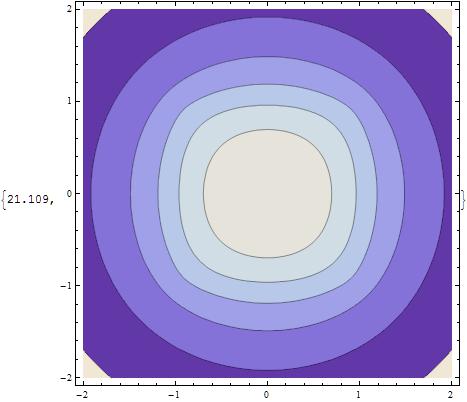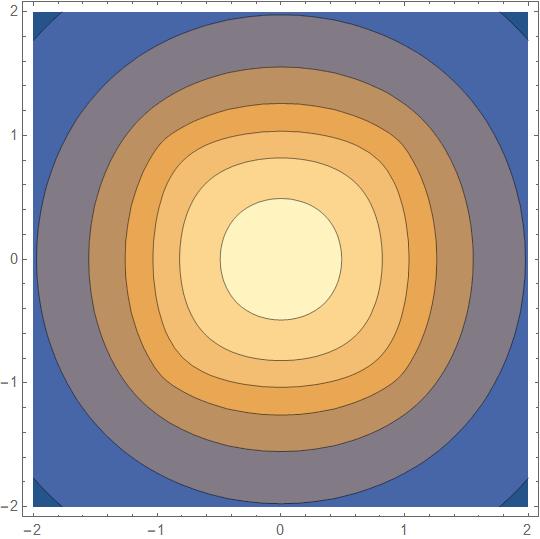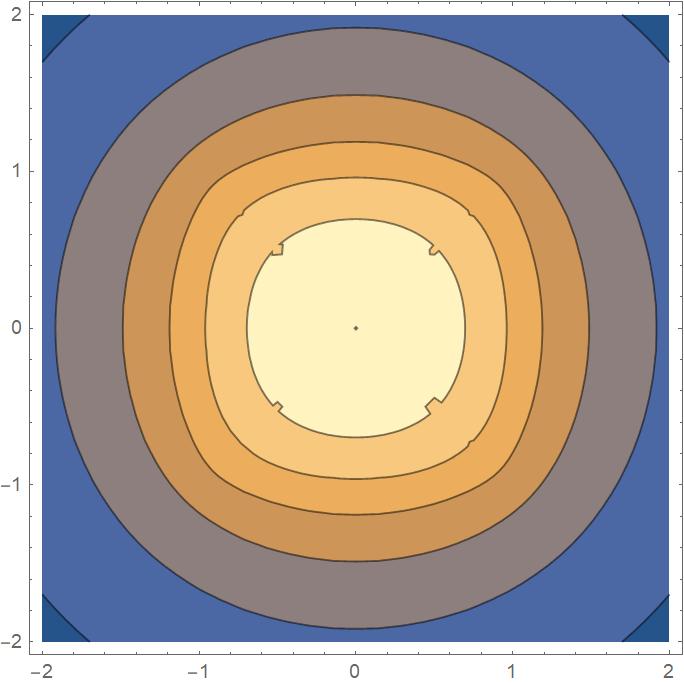One helpfull rule to get fast integration is, to do analytical integration as much as you can.
int1 = Integrate[1/Sqrt[(x - h)^2 + (y - k)^2 + (z - l)^2], {l, -1, 1},
Assumptions -> -1 <= h <= 1 && -1 <= k <= 1 && x \[Element] Reals &&
y \[Element] Reals && z \[Element] Reals]
(* -Log[-z + Sqrt[h^2 + k^2 - 2 h x + x^2 - 2 k y + y^2 + z^2]] -
Log[z + Sqrt[h^2 + k^2 - 2 h x + x^2 - 2 k y + y^2 + z^2]] +
Log[1 - z + Sqrt[1 + h^2 + k^2 - 2 h x + x^2 - 2 k y + y^2 - 2 z + z^2]] +
Log[1 + z + Sqrt[1 + h^2 + k^2 - 2 h x + x^2 - 2 k y + y^2 + 2 z + z^2]] *)
I do the second integration with the rule based integrator (Rubi) by Albert Rich (see http://www.apmaths.uwo.ca/~arich/ ), because, in contrast to Mathematica, it gives an antiderivative without discontinuities.
rint2[x_, y_, z_, h_, k_] = Int[int1, k];
Take integration values at borders to get the definite integral.
rint2def[x_, y_, z_, h_] =
rint2[x, y, z, h, 1] - rint2[x, y, z, h, -1] //
Simplify[#, Assumptions -> -1 <= h <= 1 && -1 <= k <= 1 &&
x \[Element] Reals && y \[Element] Reals && z \[Element] Reals] &
(* -h ArcTan[((-1 + y) (-1 + z))/((h - x) Sqrt[
2 + h^2 - 2 h x + x^2 - 2 y + y^2 - 2 z + z^2])] +
x ArcTan[((-1 + y) (-1 + z))/((h - x) Sqrt[
2 + h^2 - 2 h x + x^2 - 2 y + y^2 - 2 z + z^2])] +
h ArcTan[((1 + y) (-1 + z))/((h - x) Sqrt[
2 + h^2 - 2 h x + x^2 + 2 y + y^2 - 2 z + z^2])] -
x ArcTan[((1 + y) (-1 + z))/((h - x) Sqrt[
2 + h^2 - 2 h x + x^2 + 2 y + y^2 - 2 z + z^2])] -
h ArcTan[((1 - y) (1 + z))/((h - x) Sqrt[
2 + h^2 - 2 h x + x^2 - 2 y + y^2 + 2 z + z^2])] +
x ArcTan[((1 - y) (1 + z))/((h - x) Sqrt[
2 + h^2 - 2 h x + x^2 - 2 y + y^2 + 2 z + z^2])] -
h ArcTan[((1 + y) (1 + z))/((h - x) Sqrt[
2 + h^2 - 2 h x + x^2 + 2 y + y^2 + 2 z + z^2])] +
x ArcTan[((1 + y) (1 + z))/((h - x) Sqrt[
2 + h^2 - 2 h x + x^2 + 2 y + y^2 + 2 z + z^2])] - (-1 +
z) ArcTanh[(1 - y)/Sqrt[
2 + h^2 - 2 h x + x^2 - 2 y + y^2 - 2 z + z^2]] -
y ArcTanh[Sqrt[2 + h^2 - 2 h x + x^2 - 2 y + y^2 - 2 z + z^2]/(
1 - z)] -
ArcTanh[(-1 - y)/Sqrt[
2 + h^2 - 2 h x + x^2 + 2 y + y^2 - 2 z + z^2]] +
z ArcTanh[(-1 - y)/Sqrt[
2 + h^2 - 2 h x + x^2 + 2 y + y^2 - 2 z + z^2]] +
y ArcTanh[Sqrt[2 + h^2 - 2 h x + x^2 + 2 y + y^2 - 2 z + z^2]/(
1 - z)] +
ArcTanh[(1 - y)/Sqrt[
2 + h^2 - 2 h x + x^2 - 2 y + y^2 + 2 z + z^2]] +
z ArcTanh[(1 - y)/Sqrt[
2 + h^2 - 2 h x + x^2 - 2 y + y^2 + 2 z + z^2]] -
y ArcTanh[Sqrt[2 + h^2 - 2 h x + x^2 - 2 y + y^2 + 2 z + z^2]/(
1 + z)] -
ArcTanh[(-1 - y)/Sqrt[
2 + h^2 - 2 h x + x^2 + 2 y + y^2 + 2 z + z^2]] -
z ArcTanh[(-1 - y)/Sqrt[
2 + h^2 - 2 h x + x^2 + 2 y + y^2 + 2 z + z^2]] +
y ArcTanh[Sqrt[2 + h^2 - 2 h x + x^2 + 2 y + y^2 + 2 z + z^2]/(
1 + z)] - Log[-z + Sqrt[1 + h^2 - 2 h x + x^2 - 2 y + y^2 + z^2]] -
Log[-z + Sqrt[1 + h^2 - 2 h x + x^2 + 2 y + y^2 + z^2]] +
Log[1 - z + Sqrt[2 + h^2 - 2 h x + x^2 + 2 y + y^2 - 2 z + z^2]] +
Log[((1 - z + Sqrt[
2 + h^2 - 2 h x + x^2 - 2 y + y^2 - 2 z + z^2]) (1 + z + Sqrt[
2 + h^2 - 2 h x + x^2 - 2 y + y^2 + 2 z + z^2]) (1 + z + Sqrt[
2 + h^2 - 2 h x + x^2 + 2 y + y^2 + 2 z + z^2]))/((z + Sqrt[
1 + h^2 - 2 h x + x^2 - 2 y + y^2 + z^2]) (z + Sqrt[
1 + h^2 - 2 h x + x^2 + 2 y + y^2 + z^2]))] *)
The last integration has to be done numericaly.
rint3[x_, y_, z_] := NIntegrate[rint2def[x, y, z, h], {h, -1, 1}]
ContourPlot now finishes within 21 seconds.
ContourPlot[rint3[x, y, 1/2], {x, -2, 2}, {y, -2, 2},
ImageSize -> 400] // Timing





Henrik Schumacheranswer. You must only to modify the code. $\endgroup$pothas no definition of the variables within it, so of course it will never be evaluated forz = 0.5(or indeed any other value). $\endgroup$